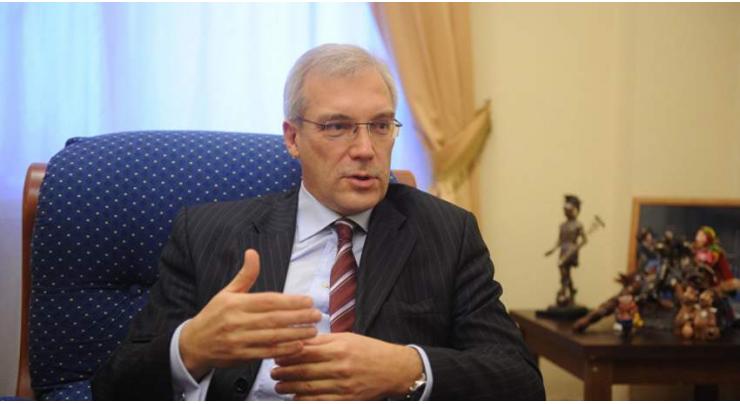
Russia Supports OSCE In Ukraine But Demands More Objectivity - Deputy Foreign Minister
Fakhir Rizvi Published March 18, 2019 | 10:20 PM

Russia supports the actions of the OSCE Special Monitoring Mission to Ukraine but requires more objectivity in assessing Kiev's actions, Russian Deputy Foreign Minister Alexander Grushko on Monday
"We have supported it [the OSCE mission] from the very beginning. And we continue to invest in it 'politically' with personnel. We want it to operate in full compliance with its mandate. Meanwhile, we don't hide our criticism of its actions. For instance, we think it should cover the conflict zone more proportionally and more evenly - it should not only work on the side of Donetsk and Luhansk but also monitor everything that is happening on the side of Kiev," Grushko said in an interview with the International Affairs magazine.
He added that Moscow will require more impartiality in covering everything that concerns security on the ground. Grushko stressed that Moscow has been insisting on recording "fire as well as hits" on both sides for quite a long time in order to make the real situation more clear.
Moreover, Russia demands that the OSCE record thoroughly all the cases when Kiev breaches its obligations.
The OSCE Special Monitoring Mission to Ukraine (SMM) was deployed on March 21, 2014 as an unarmed civilian mission. Its main aim is to observe and report everything that is happening in Ukraine. The mission also serves as a facilitator in dialogue between the warring parties in eastern Ukraine.
The conflict in Donbas started in 2014, when the Ukrainian authorities launched a military operation against the Donetsk and Luhansk People's Republics, which had refused to recognize the new government in Kiev that came to power after what they considered to be a coup.
In February 2015, the warring parties signed the Minsk peace accords to end the fighting in the region, but the situation has remained tense, with both sides accusing each other of ceasefire violations.
Related Topics
Recent Stories

HEC reviews curricula for environmental sciences degree programme

ICC Asia looking forward to an action-packed Asia Cricket Week

Yuvraj Singh named ICC Men’s T20 World Cup 2024 Ambassador

Greece hands Olympic flame to 2024 Paris Games hosts

Two Kyiv hospitals evacuating over feared Russian strikes

World must act on neurotech revolution, say experts

Charles & Catherine's cancer diagnoses

Champions Alcaraz and Sabalenka through in Madrid Open

King Charles to resume some public duties during cancer treatment: palace

US defense chief announces $6 bn in security aid for Ukraine

Heavy rains cause damage to Spezand-Taftan railway track

Woman stabbed in Israel, attacker killed: police
More Stories From World
-
6,000 French police to welcome Olympic torch amid bonus boost
6 minutes ago -
Taiwan hit by several quakes, strongest reaching 6.1-magnitude
26 minutes ago -
'Ballistic' Bairstow stars as Punjab pull off record T20 chase
26 minutes ago -
Tennis: ATP/WTA Madrid Open results - 2nd update
26 minutes ago -
Junta-led Burkina Faso suspends BBC, Voice of America for two weeks
1 hour ago -

Two Kyiv hospitals evacuating over feared Russian strikes
2 hours ago
-

World must act on neurotech revolution, say experts
2 hours ago -

Charles & Catherine's cancer diagnoses
2 hours ago -

King Charles to resume some public duties during cancer treatment: palace
2 hours ago -

US defense chief announces $6 bn in security aid for Ukraine
2 hours ago -

Woman stabbed in Israel, attacker killed: police
2 hours ago -

Israeli-fired unexploded bombs could take 14 years to clear: UN
2 hours ago






